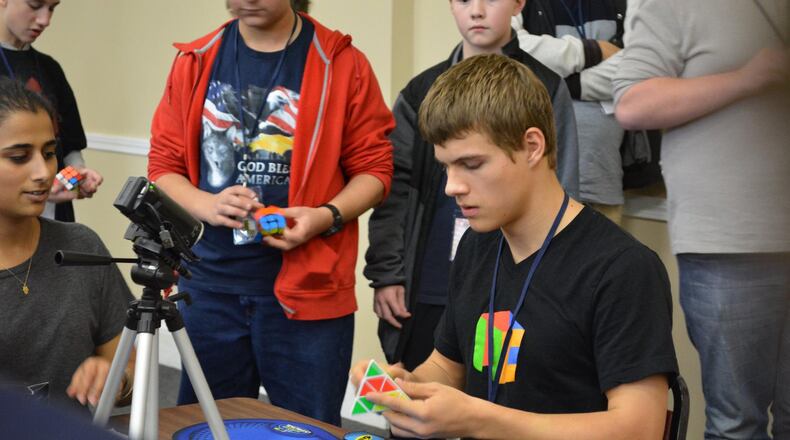“The Rubik’s Cube is sort of mysterious,” explained Brads. “At first, I wanted to know how the combinations work to solve it, but later on, once I figured out how the thing works, it became very much like a sport or playing an instrument, where I was trying to refine my technique.”
Brads said when he was a child, his dad, who is a teacher at Legacy Christian Academy in Xenia, looked up how to solve the Rubik’s Cube and helped him learn how to do it. Brads said it took him about a month to memorize how to solve it, but then quickly it became second nature. Brads can solve the Rubik’s Cube with his eyes closed.
In high school, Brads said he practiced two to three hours a day with the Rubik’s Cube.
Brads honed his skill to the point of being ranked third in the world for solving the Pyraminx Rubik’s Cube, which is a Rubik’s Cube shaped like a pyramid. He averaged 2.04 seconds to finish the three-dimensional puzzle at the 2017 World Rubik’s Cube Championship in Paris, France.
He won two World Championships in the Pyraminx and set seven world records for solving the Pyraminx.
Brads also reached ninth in the world for the average 3x3 Rubik’s Cube solve at the 2019 fall Flag City competition in Findlay, Ohio, where he averaged 6.29 seconds to finish. Brads said he set two North American records for solving the 3x3 Rubik’s Cube.
“I made kind of a name for myself in the cubing community,” Brads said.
During his senior year of high school, Brads went on a school mission trip to Costa Rica, which coincided with a Rubik’s Cube competition there. During the contest, he connected with a missionary family serving in Costa Rica.
That connection led him to take a gap year in Costa Rica before staring at Cedarville, where one of the main things he did was study the Bible. He also organized a Rubik’s Cube tournament while he was in Costa Rica.
“That really changed my life,” Brads said.
When he came back stateside, Brads decided he didn’t want to study engineering, but instead wanted to study the Bible and eventually get his masters of divinity. He is also studying Spanish at Cedarville.
Brads doesn’t practice the Rubik’s Cube for hours a day anymore, but said he will compete again when the coronavirus pandemic allows for competitions to be held in person.
About the Author

